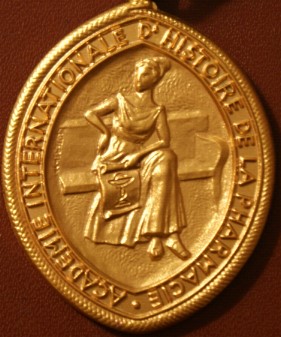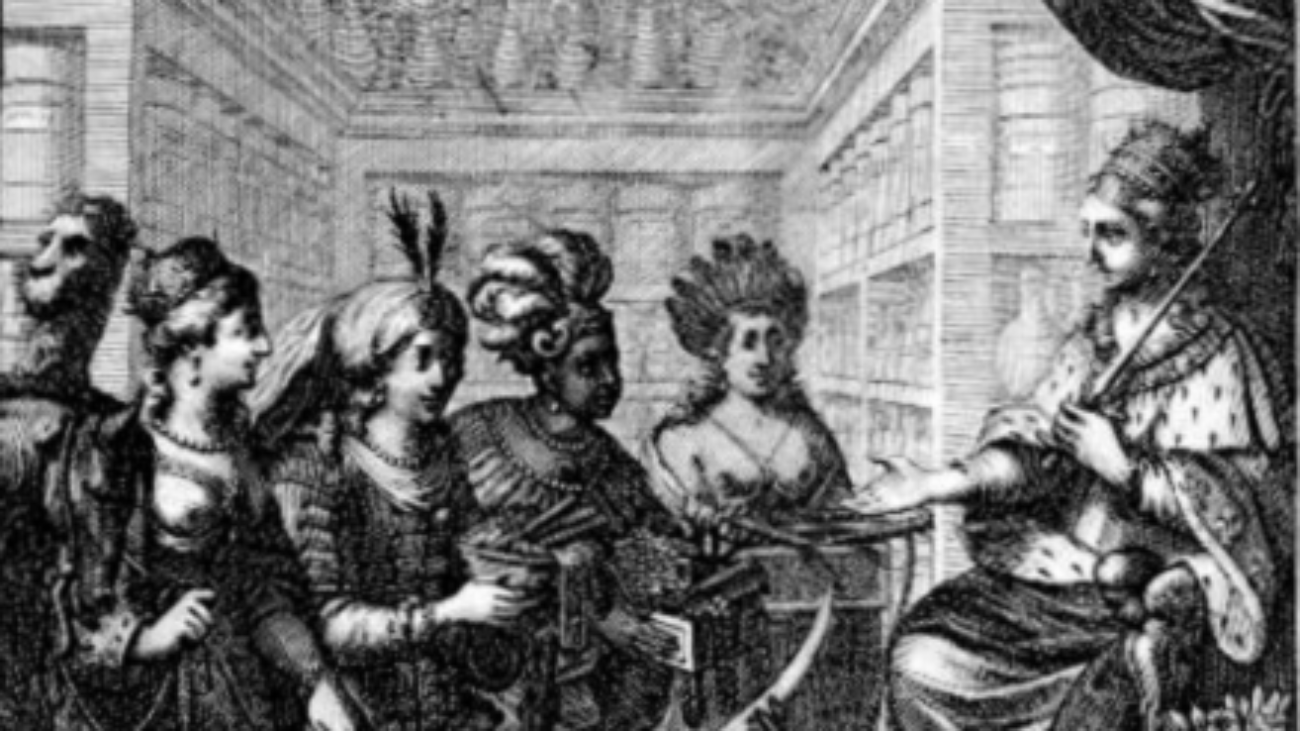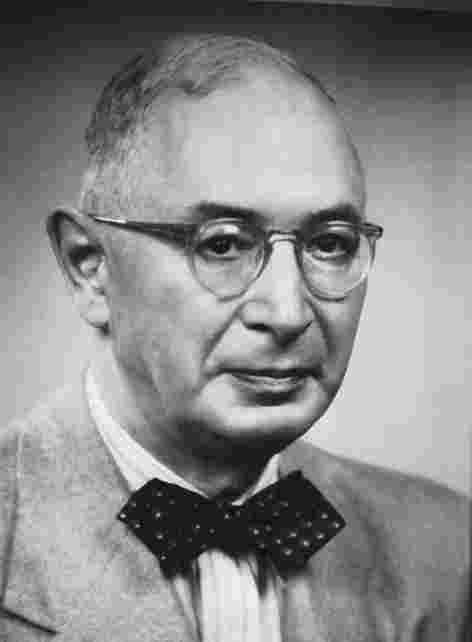 |
||||||
|
George Urdang
|
The International Academy of History of Pharmacy was created in 1952, based on an idea of Pr Georg Edmund Dann, from Kiel, for the 70th anniversary of George Urdang. The represented countries among the founders are the following (numbers of members are in parenthesis) : Germany (2), Argentina (1), Austria (2), Belgium (2), Brazil (1), Denmark (2), Ecuador (1), Spain (2), USA (1), Finland (2), France (2), UK (2), Israël (1), Italy (1), Japan (1), Norway (1), The Netherlands(2), Peru (2), Sweden (2), Switzerland (2) et Yougoslavia (2). The executive committee was composed of George Urdang, president, Georg Edmund Dann and Eugène-Humbert Guitard, vice-presidents, Pieter Hendrik Brans, general secretary, et Dirk Arnold Wittop Koning, treasurer. The first formal meeting took place in Paris in 1953, during the IFP (International Federation of Pharmacy), le 17th of september, in the famous Salle des Actes of the Faculty of Pharmacy. |
|||||
|
Translation of Urdang’s message in 1953 : Dear Friends and Colleages, The words are missing to express how much I regret that my health state imposes to give you this few words of salutation and congratulations in writing, instead of orally. I think that Moses’ feelings were similar when he saw the Promised Land without the possibility to enter it. It is true that I cannot meet you, my friends and colleages. But I feel at that moment your spiritual presence and I hope that you feel mine. The idea of a modern Academy, of an association of elected representatives of a cultural area in order to clarify and to improve knowledges in this domain, and their use in a theoric as well as practical way, has, in the pharmaceutical world, always made an attempt of execution. It is in the house of the apothecary from Florence, Francesco Grazzini, called il Lasca, and following his initiative that was founded in 1584 the famous « Accademia délia Crusca ». It was scientific meetings in the Mathieu Fr. Geoffroy’s house that were the beginning of the « Académie Royale des Sciences » founded in 1666 in Paris. Finally, one of the association that transformed into the « Royal Society » foundation originated from meetings that were organized at the apothecary Cross’ home, in Oxford. It is then not surprising in the list of scientific academies, of which the number is increasing continuously since the 17th century, that we find always pharmacists’ names. « Academies » dedicated exclusively to scientific and professional issues of Pharmacy are younger if not more recent : It is, in Spain, « Real Academia de Farmacia, in Brazil, l' »AacademiaNacional de Farmacia » (founded in 1937), and in France l' »Académie de Pharmacie » (Founded in 1946). These academies are, according to the idea at the origin of their creation, and according also to their activity, national by nature. The « International Academy of History of Pharmacy » jointed the others as an international reprsentation or better, as a supranational of the historical aspects of history of pharmacie. Then, the representatives that all are well recognized were able to find, in the area of activity and critics related to the history of pharmacy, a supranational home and field of activity. It is our honorable German colleage, M. Georg, Edmund Dann, who started the discussion concerning the idea of an academy and gave the main principles to realize it practically. Dutsch colleages, MM. P. H. Brans and D.A. Wittop Koning, gave him a needed help to do it. My 70th anniversary, the 13th of june, 1952, was finally the opportunity to actually create it. Members of the International Academy of History of Pharmacy, dear friends and colleages : with this foundation that we have done, wa have taken a road which can drives in our cultural domain to similar success of those obtained by Mieli and his co-workers in the illimited area of general natural sciences. The key condition for success is to recognize that we do not have to fear from each other, but that we can hope everything in case of an active cooperation. In the career of the International Academy of History of Sciences, never jealousies, neither national nor personal, did play any role. The national individualities were stimulating agents, the personal interests of agents acting for the commun work. In this memorable time, I beg you, my friends and comrads of fight, to keep constantly care of thegreatness of your duty : to serve, thanks to research and description, in the area of history of pharmacy, for the best of fraternity and worlwide cooperations. |
During the first formal meeting of the IAHP in Paris (1953), George Urdang deliver in writing the following message to the congress (in French) :
Mes chers Amis et Confrères,
Je manque de mots pour vous exprimer combien je regrette que mon état de santé m’oblige à vous transmettre ces quelques paroles de salutation et de felicitation par écrit, au lieu de vous les adresser de vive voix. Je crois que les sentiments de Moïse étaient semblables, lorsqu’il obtint de voir la terre promise sans avoir la possibilité d’y entrer.
Il est vrai, je ne peux pas vous rencontrer, mes amis et confrères. Mais je sens en ce moment votre présence spirituelle et j’espère que vous sentez la mienne. L’idée d’une « académie » moderne, d’une association des représentants élus d’un secteur culturel spécial dans le but d’éclaircir et de perfectionner des connaissances dans ce domaine et de leur utilisation dans un sens théorique autant que pratique, a, dans le monde pharmaceutique, toujours donné lieu à des tentatives de réalisation. C’était dans la maison de l’apothicaire florentin Francesco Grazzini, nommé il Lasca, et suivant son initiative que fut fondée en 1584 la célèbre «Accademia délia Crusca ». Ce sont des réunions scientifiques tenues dans la maison de l’apothicaire parisien Mathieu Fr. Geoffroy, qui furent le début de 1′ Académie Royale des Sciences », fondée en 1666 à Paris. L’une des associations enfin, dont la transformation conduisit en 1662 à la fondation de la « Royal Society » en Angleterre, eut son origine dans les réunions qui avaient lieu chez l’apothicaire Cross, d’Oxford. Il n’est donc pas étonnant que dans les listes des académies scientifiques, dont le nombre augmente continuellement depuis le XVIIe siècle, se trouvent toujours des noms de pharmaciens.
Des « Académies », qui furent consacrées exclusivement aux problèmes scientifiques et professionnels de la pharmacie, sont d’origine plus jeune sinon récente : ce sont, en Espagne, la « Real Academia de Farmacia », au Brésil l’ « Academia Nacional de Farmacia » (fondée en 1937) et en France l’« Académie de Pharmacie » (fondée en 1946). Ces académies sont, d’après l’idée qui conduisit à leur création et d’après leur activité, de caractère national. « L’ Académie Internationale d’Histoire de la Pharmacie » s’est jointe à celles-ci comme une représentation internationale, ou mieux : supranationale des aspects historiques de la pharmacie, comme une espèce de chambre haute de l’histoire de la pharmacie. Ainsi les représentants qui jouissent tous d’une grande renommée ont pu trouver, dans les domaines d’activité et de critique dans le secteur de l’histoire de la pharmacie, un foyer et un champ d’action supranationaux. C’est notre honoré confrère allemand, M. Georg, Edmund Dann, qui engagea la discussion sur l’idée d’une telle académie et qui formula les principes d’une réalisation pratique. Des confrères hollandais, MM. P. H. Brans et D. A. Wittop Koning, lui prêtèrent l’aide indispensable. Mon soixante-dixième anniversaire, le 13 juin 1952, donna finalement l’occasion recherchée pour sa fondation définitive. Je n’avais qu’à accepter ce don. Le mérite en revient à MM. Dann, Brans et Wittop Koning. Il est partagé par tous ceux qui – deux dans chaque pays, où se trouvent des confrères actifs dans le domaine de l’histoire de la pharmacie – ont accepté si volontiers de devenir membres de l’académie.
Permettez-moi de rappeler qu’il existe déjà un modèle pour notre jeune académie dans le secteur des sciences naturelles générales. L’initiative de l’excellent historien des sciences, M. Aldo Mieli, a conduit en Italie, en 1929, à la fondation de 1′ « Académie Internationale d’Histoire des Sciences», qui a prospéré avec une rapidité étonnante en réputation et en importance et a organisé une série de congrès internationaux, avant que la deuxième guerre mondiale ne mît provisoirement fin à son activité. Renouvelée en 1946, l’Académie des Sciences Naturelles s’est créée en 1947, une institution complémentaire internationale et non individuelle, permettant d’élargir son activité par la fondation de l’Union Mondiale d’Histoire des Sciences, qui embrasse actuellement vingt associations nationales des sciences naturelles. L’ Académie, ainsi que 1′ « Union » jouissent de l’aide de l’U.N.E.S.CO. et de la reconnaissance du monde civilisé.
|
|||||


